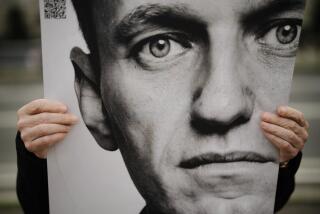Mideast Feud
JERUSALEM — In the wake of the Moscow coup’s collapse, Palestinians are scrambling to explain why many of them celebrated Gorbachev’s fall, and Israeli officials worked hard to let everyone know why they avoided criticizing the usurpers, despite their distaste for Kremlin conservatives.
Between breaths, each side attacked the other.
The Palestine Liberation Organization issued a tepid statement that said the group looked forward to a restoration of rule “by state institutions and by the Soviet people.” It blamed unspecified news outlets for giving the impression that Palestinians welcomed the upheaval.
Spokesmen tried to separate Palestinian feelings about Gorbachev’s policy from their opinions of the coup. They are upset with Gorbachev for permitting tens of thousands of Soviet Jews to emigrate without guarantees that they wouldn’t displace Palestinians in the West Bank and Gaza Strip. Complaints are often heard that the Soviets have taken a back seat to Washington, Israel’s top ally.
Still, observers recognized that the reactions might be seen in the same light as the support many gave President Saddam Hussein during Iraq’s invasion of Kuwait. They fretted that another public relations blunder had been committed. And they feared that the Israelis would try to use the issue to discredit Palestinians in advance of a Middle East peace conference planned and sponsored by the United States and the Soviet Union.
Israelis quickly went on the offensive. “Upon hearing these voices, one gets the feeling that there isn’t a real understanding for peace,” said Prime Minister Yitzhak Shamir.
Shamir went out of his way to explain his own restraint in not criticizing the coup. He said that the main worry was safety for Soviet Jews and for continued emigration: “I’m happy I was silent. Now, it can be said and hoped that things will develop in a positive manner. We prayed that violent clashes wouldn’t take place. Our historic experience teaches us that in such instances our brethren are the first victims.”
Elsewhere in the Mideast, an official Iranian newspaper said the coup “discredited the Soviet leadership in the eyes of its people,” although Iran’s Foreign Minister Ali Akbar Velayati later congratulated Gorbachev. In Iraq, which had cheered Gorbachev’s ouster Monday, Foreign Minister Ahmed Hussein Khudayer on Thursday expressed hope for friendly ties with the Soviets. Syrian leader Hafez Assad broke his silence about the coup, sending Gorbachev a message welcoming the return of “Soviet legitimacy.”
This story was compiled from Times staff and wire reports.
More to Read
Sign up for Essential California
The most important California stories and recommendations in your inbox every morning.
You may occasionally receive promotional content from the Los Angeles Times.










